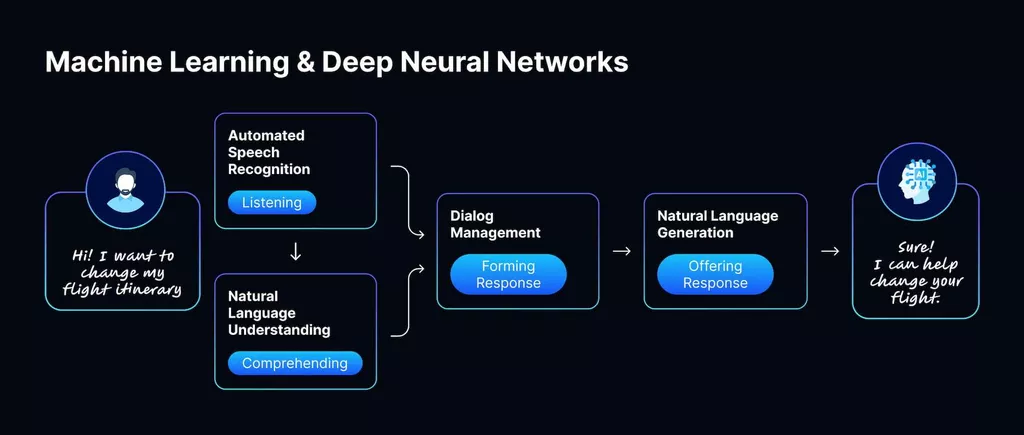The ecommerce sector has grown exponentially over the past decade, with online retail sales projected to top $7.4 trillion in 2025, with a strong focus on artificial intelligence (AI). By implementing AI in online stores, companies can make more accurate sales forecasts, create an optimal consumer experience, bring back users, and raise conversion. With careful planning, smart solutions give consumers a smooth and comfortable practice. Let’s talk in more detail about what conversational AI ecommerce is and how it affects the area.
The Definition of Conversational AI and How It Works
Conversational AI is a sophisticated system that utilizes natural language to empower cooperation between people and machines. It is based on natural language processing (NLP), machine learning (ML), and speech recognition techniques, allowing AI to correctly identify user intentions and participate in conversations where context is essential.
Conversational commerce relies on the following techniques:
- Natural language processing (NLP): This technology analyzes natural human language and speech, extracting relevant data from written or spoken material.
- AI utilizes such initial data to forecast communication patterns.
- Machine learning allows AI-backed structures to learn and become more efficient based on experience without expensive programming.
The most famous conversational AI implementations in ecommerce include virtual assistants (we all know Alexa or Siri) and voice solutions that make conversational shopping and business interactions easier.
Essential Elements of Conversational AI

Having understood what conversational AI is, let’s discuss how such systems actually function. Whether you’re using web ecommerce chatbot or text-to-speech shopping solutions, all modern AI-backed structures rely on similar basic procedures:
- Input generation: People may provide information by voice or typing. Automatic speech recognition (ASR) technology translates spoken phrases into machine-readable text.
- Analysis of input data: The tools must accurately decipher the message’s meaning. Natural language understanding (NLU) interprets the message text to recognize the consumer’s intent properly.
- Dialogue management: At this stage, the response is formed by considering the text’s interpretation through dialogue management. AI structure generates answers and converts them into a human-readable format with natural language generation (NLG), another element of NLP.
Reinforcement learning teaches and improves a system’s precision over time. It is also known as machine learning, where the AI-backed solution takes corrections and learns from practice to deliver optimal outcomes during future cooperation.
The Profits of Conversational AI

Today, Conversational AI has become a revolutionary solution for ecommerce businesses, opening up many opportunities and competitive advantages. Let’s look at why more and more firms are thinking about integrating such smart systems:
- Enhanced client engagement: Conversational AI enables effective communication that resonates with clients. Realizing their needs, preferences, and emotions allows for deeper connections, raising client gratification and loyalty.
- Efficiency and capital savings: Automating routine activities with AI-powered structures optimizes procedures and cuts operational spending. It will allow your specialists to concentrate on higher-value work that increases the firm’s efficiency and productivity. Such systems are available 24/7, meaning you won’t have to spend huge sums on salaries for a considerable support department.
- Omnichannel action and consistency: Conversational AI can be easily deployed across multiple platforms, ensuring a stable firm presence on the official website and partner portals, social networks, mobile applications, and online assistants. This consistency forms brand identity and builds trust among consumers.
- Increased scalability: Custom bots may be scaled to meet your business needs. You can set up systems that process multiple requests simultaneously and provide individualized answers quickly and accurately.
Conversational AI in ecommerce could be a critical factor in attracting tech-savvy consumers who value fast, efficient interactions. Implementing such technologies may give you an advantage over competitors who only use traditional chatbots or outdated technical support methods.
Use Cases of Conversational AI in Ecommerce
You may be disappointed to learn that clients are becoming less and less willing to collaborate with you. The study found that 81% of clients try to solve a problem independently before seeking help from a company. When they contact client support, your business has already failed to provide an ideal experience. Adopting conversational AI ecommerce into your support channels improves the user experience with your firm. Let’s consider other options for utilizing such virtual assistants:
- Increased user self-service: By suggesting self-service options, conversational AI streamlines the client experience, making it efficient and seamless. Users don’t have to wait for a live specialist to become available and navigate sites or applications with many sections. Instead, they obtain instant advice and the ability to complete objectives conversationally and conveniently. Through interactive communication, such smart systems understand people’s queries and guide them to appropriate data or actions.
- Customer data analytics: Every time a client opens your official portal, cooperates with your organization on social media, or sends a message or email, he leaves a trail of digital breadcrumbs. In the past, you needed to analyze your customer relationship management (CRM), third-party trackers, and various analytics instruments to gain insight into user groups. You can now feed data collected from your virtual assistant into your AI structure to generate more relevant content for various sales and marketing channels.
- Inventory management: Adopting conversational AI allows you to check inventory, track deliveries, and analyze order data. Such chatbots can detect any abnormal activity in your supply chain. AI-backed instruments may streamline and automate the ordering and reordering process and control inventory without human intervention.
- Eliminate cart abandonment: Online retailers worldwide are struggling with cart abandonment. The average cart abandonment rate exceeds 70%, with companies losing approximately $18 billion in sales. The AI-backed structure allows firms to retarget potential clients and remind them to place an order by offering a tempting discount. Because customers often view products from different brands simultaneously, great deals may influence purchasing decisions.
These are just several options for how a conversational AI platform may be used in ecommerce. We look forward to even more non-standard and revolutionary applications emerging as technology advances.
Primary Difficulties with Conversational AI in Ecommerce
As we see, conversational AI ecommerce is transforming the sector, providing organizations with innovative options to improve service quality, boost sales, decrease expenditures, and grow productivity. But there are also some troubles that commercial platforms should be aware of when adopting AI-backed structures:
- Information privacy concerns: Processing considerable volumes of data for personalization raises privacy concerns, and enforcing data security regulations can be a considerable challenge.
- Algorithm Bias: AI-backed systems may exhibit bias based on training data, leading to unfair treatment of particular customer categories or inaccurate tips.
- Integration complexity: Synchronizing AI-backed structure with currently used software may be complex and resource-intensive to run smoothly.
- Cost: The cost of developing and implementing an AI-backed solution can be quite high, so the company needs to weigh the pros and cons before implementing the system.
Because malware is more accessible to attack online stores that rely heavily on AI-backed instruments, ecommerce organizations must think about robust cybersecurity measures to address emerging AI threats and deal with trusted AI software providers.
Tips for Implementing Conversational AI
Despite these troubles, AI-backed tools can revolutionize the ecommerce sector. Firms that overcome all challenges will have a maximum chance of future success. We have collected several recommendations for organizations that are just planning to implement conversational AI in their activities:
- Start small: Don’t try to adopt AI-based products in all aspects of your business simultaneously. Begin with a limited area and gradually scale your practice.
- Concentrate on the client: The main goal of your AI-backed tool is to improve the client experience. Ensure your AI system was created with your clients in mind.
- Be transparent: Inform clients about how you utilize AI and save their data. It will help gain users’ trust.
- Invest in expertise: AI is not an elementary technology. Invest in the expertise needed to handle and maintain AI-backed instruments.
By following these guidelines, firms can avoid the difficulties of utilizing AI ecommerce tools and reap the profits of such a powerful technique.
Final Words
In the active ecommerce environment, conversational AI is a game changer, driving sales and client practice. By offering online shopping assistants, individualized advice, and seamless cooperation, AI-backed instruments form a customer-centric practice that raises income and conversion.
AI solutions from MetaDialog enable organizations to deliver a customized experience, automate purchasing, and define upsell and cross-sell opportunities. You may book a demo on the website to determine whether such a product suits your situation. In an era of technological innovation, AI adoption is critical to unlocking the full potential of ecommerce, revolutionizing sales tactics, and long-term business prosperity.
